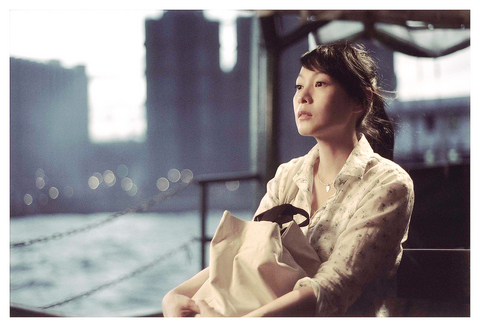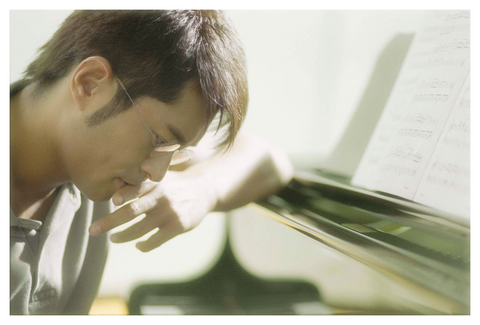A fading genre that pales before testosterone-charged gangster and martial art flicks, romances are hard to find these days in Chinese-language cinema. For those with a soft spot for a genuine love story, Happy Birthday (生日快樂) is a wish come true. And to those who look down upon such films as no more than chick flicks, this film merits appreciation for its quality filmmaking.
Adapted from a novella by singer and actress Rene Liu (劉若英), who apparently is a versatile talent, the film tells of a decade-long love story between Mi (played by Liu) and Nam (played by Louis Koo, 古天樂). A piano major in college, Mi gives her heart to Nam but struggles to keep a distance from the wealthy woman magnet, who is crazy about the baffling Mi.
The two part after graduation, yet the love between them remains. Mi believes that their story will have a happy ending after she gains more self-confidence and overcomes the fear of losing the love of her life.

PHOTOS COURTESY OF APPLAUSE FILM
The dream shatters when a text message from Nam says he will soon marry another girl. Years later, Mi still receives Nam's messages sent on her birthday and trusts that their love will last till the end of time.
Directed by award-winning cinematographer and director Jingle Ma (馬楚成), the technically accomplished film is an eye-pleasing visual treat in which the pure and innocent aura of romance is accented by lyrical lighting. The editing is smooth and stylish.
An early sequence made up of intercut shots of the grown-up Mi, flashbacks of Mi's mom thumping downstairs and Nam tersely explaining the character's deeply rooted fear of losing her loved ones is a demonstration of how a narrative can be enhanced through thoughtful editing.

Part of the film's merits also go to the finely adapted screenplay (director Silvia Chang (張艾嘉) is one of the screen writers). Love and romance are manifested in seemingly trivial details of daily life, in subtle gestures and exchanges of gaze rather than words and set-piece performances. The delicate touch of the narration saves the film from excessive sentimentalism with the revelation of Nam's death.
The film benefits from its trust in its actors, who are given a rare freedom to bring their talents into full play. Award-winning actress Liu grips the heart with her superb portrait of one of the strongest female characters that have come out of Chinese-language cinema in recent years. Echoing Chang's emotionally complicated female leads in Tempting Heart (心動, 1999) and 20, 30, 40 (2004), Mi is an independent modern woman who is kind and strong but insecure and unable to open her heart to love.
Graced by fine performances, intelligent storytelling and elegant simplicity, Happy Birthday offers an enjoyable 90 minutes of escape from the all too cynical world where love has lost its simplest meaning.

Towering high above Taiwan’s capital city at 508 meters, Taipei 101 dominates the skyline. The earthquake-proof skyscraper of steel and glass has captured the imagination of professional rock climber Alex Honnold for more than a decade. Tomorrow morning, he will climb it in his signature free solo style — without ropes or protective equipment. And Netflix will broadcast it — live. The event’s announcement has drawn both excitement and trepidation, as well as some concerns over the ethical implications of attempting such a high-risk endeavor on live broadcast. Many have questioned Honnold’s desire to continues his free-solo climbs now that he’s a

As Taiwan’s second most populous city, Taichung looms large in the electoral map. Taiwanese political commentators describe it — along with neighboring Changhua County — as Taiwan’s “swing states” (搖擺州), which is a curious direct borrowing from American election terminology. In the early post-Martial Law era, Taichung was referred to as a “desert of democracy” because while the Democratic Progressive Party (DPP) was winning elections in the north and south, Taichung remained staunchly loyal to the Chinese Nationalist Party (KMT). That changed over time, but in both Changhua and Taichung, the DPP still suffers from a “one-term curse,” with the

Lines between cop and criminal get murky in Joe Carnahan’s The Rip, a crime thriller set across one foggy Miami night, starring Matt Damon and Ben Affleck. Damon and Affleck, of course, are so closely associated with Boston — most recently they produced the 2024 heist movie The Instigators there — that a detour to South Florida puts them, a little awkwardly, in an entirely different movie landscape. This is Miami Vice territory or Elmore Leonard Land, not Southie or The Town. In The Rip, they play Miami narcotics officers who come upon a cartel stash house that Lt. Dane Dumars (Damon)

Today Taiwanese accept as legitimate government control of many aspects of land use. That legitimacy hides in plain sight the way the system of authoritarian land grabs that favored big firms in the developmentalist era has given way to a government land grab system that favors big developers in the modern democratic era. Articles 142 and 143 of the Republic of China (ROC) Constitution form the basis of that control. They incorporate the thinking of Sun Yat-sen (孫逸仙) in considering the problems of land in China. Article 143 states: “All land within the territory of the Republic of China shall